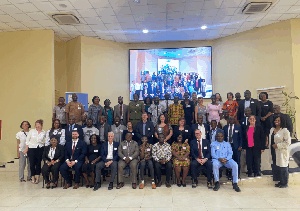- Home - News
- Elections 2024
- News Archive
- Crime & Punishment
- Politics
- Regional
- Editorial
- Health
- Ghanaians Abroad
- Tabloid
- Africa
- Religion
- Photo Archives
- Press Release
General News of Tuesday, 20 May 2025
Source: www.ghanawebbers.com
Cash in Crisis: MIASA conference highlights need to balance digital and cash payments
Digital payment systems are growing across Africa. The Merian Institute for Advanced Studies in Africa (MIASA) held a conference to discuss cash's role amid financial disruption.
The conference was titled “Cash in Crisis in Africa: Navigating Financial Realities in Times of Disruption.” It focused on how African societies respond to economic shocks. Participants explored the balance between traditional finance and new innovations.
The annual MIASA conference took place at the University of Ghana’s Institute of Statistical, Social and Economic Research (ISSER). Local and international experts gathered to discuss finance's evolving nature on the continent.
Professor Grace Diabah, MIASA’s director in Ghana, highlighted the conference's importance. She noted that COVID-19 and funding cuts have exposed cultural vulnerabilities. MIASA aims to promote dialogue among scholars, practitioners, and civil society leaders.
Professor Joseph Awetori Yaro emphasized the discussions' relevance. He stated that crises directly impact millions of Africans. Understanding value creation or loss during these times is crucial for political, economic, and social processes.
Fabio Knümann from Deutsche Bundesbank delivered the keynote address. He provided a global view on cash's evolving role. Despite digital payments' rise, cash remains vital for many people worldwide, especially in Africa.
“Cash is still a companion for millions,” he said. He cited data showing that 56% of South Africans used cash for their last transaction. This indicates that cash continues to dominate despite mobile money growth.
“These systems do not replace cash; they coexist with it,” he added. Knümann shared a story about a woman in Namibia who sold vegetables without a mobile phone or bank account.
“She told me, ‘If I can hold it, I can trust it,’” he recalled. This illustrates the trust physical money commands in informal economies.
Knümann explained that demand for cash often increases during crises like pandemics or natural disasters. “Cash becomes a fallback,” he said. It works without passwords, apps, or electricity.
While digital systems offer speed and convenience, Knümann warned against assuming one universal model works everywhere. “There is no single African or European payment culture,” he stressed.
He advocated for supporting hybrid infrastructures with both digital and cash options. This approach offers resilience and choice to users.
Knümann praised African central banks’ efforts to ensure access to cash everywhere. He mentioned Ghana’s distribution policy as an example of best practice alongside South Africa’s community partnerships for underbanked regions.
“These measures treat cash as a public good,” he said regarding policy design. He called for smart infrastructure planning and inclusive decision-making processes.
“Supporting cash does not mean resisting innovation,” Knümann clarified. It ensures digital development does not limit choices for those relying on analog systems.
He urged central banks to include marginalized groups in payment infrastructure planning—like the elderly and rural dwellers—who are affected by changes but rarely consulted.
Looking ahead, Knümann described three possible futures based on a Bundesbank study: minimal cash usage in a hyper-digital world; a “cash renaissance” rediscovering its benefits; or slow marginalization where access declines.
“These aren’t predictions; they’re scenarios helping us understand today’s decisions,” he explained.
He pointed out Africa’s mobile money systems as innovative solutions tailored to local needs even without stable network access bridging informal and formal economies.
“The real opportunity lies in bringing together different perspectives,” he said about generating new ideas collectively regarding payments' future.
Knümann emphasized collective responsibility in shaping payment systems’ future: “If you value cash, use it.”
He likened the payment system to ships navigating rough seas together despite being on different boats: “If we share signals and learn from each other, we can navigate successfully.”











